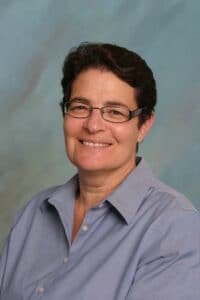Arc of Onondaga’s executive director talks about the agency’s mission, staffing problems and the 24/7 nature of the work provided to people with developmental disabilities
By Mary Beth Roach
Ellen Gutmaker has been with Arc of Onondaga for 22 years, and the executive director the agency on Wilbur Avenue in Syracuse since 2013. With about 500 employees, Arc of Onondaga serves about 700 people with 40 sites — residences and day programs — throughout the county.
Q: Can you briefly describe the work of Arc of Onondaga?
A: We provide supports and services to people with developmental disabilities.
Q: What services do you offer?
A: We have residential programs, which are 24-hour supports. We have a community day program; we have a number of day habilitation programs. We also offer community habilitation. We support people to be successful in competitive employment and provide training. We have a number of business services; we provide employees to complete contracts, so we’re providing employment to people with disabilities as well. We’ve evolved as the service delivery system has, to encourage people to be more active and involved successfully in their own community. We provide supports to people. We get funding through what is called our family support services, and through Medicaid services to support people individually.
Q: What is your budget and how are you funded?
A: The budget’s about $26 million and we’re funded partially through Medicaid dollars through the services we provide. We also have some state funding. We also have some state contracts through NYSID, which is the New York State Industries for the Disabled. For example, we have contracts to clean facilities that are what they call NYSID contracts, so we get paid by NYSID to clean facilities.
Q: You’re heading into your 71st year. Can you talk about the growth and changes of the organization over that time?
A: The entire service delivery system for people with disabilities has changed over the years. They’ve gone from sort of a medical model to more of a treatment model to a person-centered model.
Our services have evolved with it. I’ll give you the best example. Monarch used to have a work center where we completed subcontract work with agency businesses. A couple of years ago, we closed the work center and made our emphasis on encouraging and supporting people to be competitively employed. We’ve adapted to the changes in service delivery changes to our entire field. We’ve gotten smaller, more individualized, more community-based support and services because that’s what people want and need to be successful in the community.
Q: You’ve got 500 employees and 700 people that you serve. That’s almost a 1:1 ratio. That’s a real individualized approach. Could you accommodate more people?
A: Yes, we can. Some of the way we operate is that we can add staff as we add people. Part of it is related to the pandemic, and we have people who we have not even been able to bring back to our services because we don’t have the staff.
Q: In your years as the executive director, what have been some of the challenges and accomplishments with the organization?
A: The pandemic has certainly been a challenge. COVID-19 has had a significant effect on the agency because when everything shut down, we stayed open. We had to continue operating 24/7 in our residential programs and with some of our cleaning contracts. One of the contracts we had is that we cleaned the vaccination site at the Fairgrounds. Operating a program in the midst of the pandemic and trying to keep people healthy and safe was a tremendous challenge. There is a lot of talk about essential workers and healthcare workers. It’s important to realize that the direct support staff and managers who work in those group homes worked through COVID and those same challenges that everybody faced, we did as well. We continue to struggle with it, as every place does. It also had an impact on our ability to recruit and retain staff. I mentioned that we haven’t even been able to bring everybody back to programs or to run some of our services. At this point, that’s because of staffing.
Adequate funding for services has been a challenge. Some of the accomplishments — I think it was a big accomplishment to close the work center and to become more community-based.
Q: What do you see for the future of the organization?
A: I think we will continue to provide the services that people want and will continue to adapt how we provide the services based on what people want. We’re actually in the process of renovating what had been our old work center. The upstairs of the Wilbur Avenue building was where the work center was. We are converting basically what is empty space into a different kind of center for opportunities. We’re going to have an art space. We’re going to have some certified day space there. We’re also going to have a training kitchen, so we’re trying to adapt how we provide services and what we’re providing to be what people need and want. So, for someone who, maybe years ago, might have come to us and worked in the work center, we provide different sorts of pre-vocational training in the community to hopefully get them a job and then give them the supports to be successful at that job.
Q: When you talk about integrating people into more of a community-based program, are there any success stories that come to mind?
A: We have tons of success stories. We have a lot of our people who used to be in day-hab and spent all their time at a site, spend time in the community volunteering. We’ve been given community awards, by, for example, Meals on Wheels for the delivery of meals that our day-hab people have been doing. We have a partnership, for example, with TCGPlayers (an online marketplace for collectible gaming cards) in downtown Syracuse, where we have a small group of staff that we employ who do the work of TCGPlayers. Some of those people have disabilities, some of them may not, but one of the people that we previously supported has now been successfully been hired by TCG Players. Those sort of individual success stories are significant.
Q: What do you think might be one or two things that the community-at-large doesn’t know or doesn’t realize about Arc of Onondaga?
A: I think because we dispersed throughout the county, people probably don’t realize how many people we support and the impact on people’s lives.
Q: Can you speak to that impact?
A: When you support in the 24-hour residential program, it’s life-changing for them. It’s a very tough decision to have a family member live in a 24-hour residential program, but one of the ways that families can look at it is that’s a very usual thing. Kids grow up, they move out of their family’s home. They develop independence and become successful and develop their own lives. Our residential programs help people do that, and it helps families realize that for their own family member.


